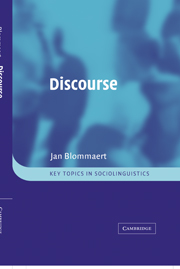Book contents
- Frontmatter
- Contents
- Preface
- Acknowledgments
- 1 Introduction
- 2 Critical Discourse Analysis
- 3 Text and context
- 4 Language and inequality
- 5 Choice and determination
- 6 History and process
- 7 Ideology
- 8 Identity
- 9 Conclusion: Discourse and the social sciences
- Notes
- Appendix: English translations of the documents in chapter 5
- Glossary
- References
- Index
6 - History and process
Published online by Cambridge University Press: 02 December 2009
- Frontmatter
- Contents
- Preface
- Acknowledgments
- 1 Introduction
- 2 Critical Discourse Analysis
- 3 Text and context
- 4 Language and inequality
- 5 Choice and determination
- 6 History and process
- 7 Ideology
- 8 Identity
- 9 Conclusion: Discourse and the social sciences
- Notes
- Appendix: English translations of the documents in chapter 5
- Glossary
- References
- Index
Summary
Introduction
So far, we have followed an itinerary that has taken us from observations on the inadequacies of notions of ‘context’ in the study of textual detail, over a view of discourse as conditioned by general patterns of inequality related to systemic differences in the way in which discourse is given functions (an effect of orders of indexicality), to a view in which we have to see discourse as both creative at a micro-level and constrained (determined) at higher levels. This itinerary has gradually taken us away from the micro-level analysis of the text – the text as single text – to higher levels influencing, conditioning, and occasioning texts – the text as part of a textual tradition, as a social, cultural, historical phenomenon. This chapter will partly dwell at this higher level of analysis, but it will also mark the beginning of a move back into the direction of the single text.
I am emphasising the importance of higher level conditions on text for two main reasons. First, such considerations have not been central to mainstream discourse analysis, and, as we have seen in several places in the previous chapters (and will see below), this absence of concern for higher level ‘context’ has led to analytical difficulties. These can be summarised as the inflation of context: several layers of context, operating at various levels, had to be squeezed into the single text or communicative event, often in an analysis that presupposed creativity, intentionality, and awareness from the participants.
- Type
- Chapter
- Information
- DiscourseA Critical Introduction, pp. 125 - 157Publisher: Cambridge University PressPrint publication year: 2005
- 1
- Cited by

